Picture this: you’re sitting in your dentist’s office, and they’ve just recommended dental implants to replace your missing teeth. Your first thought? “Are dental implants painful?” You’re not alone—this is the number one question I hear from patients considering this life-changing treatment. The good news? Modern dental implant procedures are far more comfortable than most people imagine.
Let me put your mind at ease right away: dental implants are typically much less painful than people expect. With today’s advanced techniques, proper anesthesia, and expert care, most patients describe the experience as surprisingly manageable. Your journey to a confident smile doesn’t have to be a painful one.
Key Takeaways
- Dental implant surgery is typically less painful than tooth extraction due to modern anesthesia and surgical techniques
- Most discomfort occurs during the first 3-5 days after surgery and can be effectively managed with prescribed medications •
- Individual pain tolerance varies, but 85% of patients rate their pain as mild to moderate on a 1-10 scale
- Proper aftercare and following your dentist’s instructions significantly reduces pain and speeds healing
- Long-term benefits far outweigh temporary discomfort, with implants lasting 25+ years when properly maintained
Understanding Dental Implant Pain: Separating Fact from Fiction
When we talk about whether dental implants are painful, it’s important to understand what we’re really discussing. The dental implant process involves surgically placing a titanium post into your jawbone, which will eventually support your new tooth. Yes, this is surgery—but it’s not the medieval torture chamber your imagination might conjure up.
During the actual procedure, you won’t feel pain. Your oral surgeon or dentist will use local anesthesia to completely numb the area. Many patients also opt for sedation dentistry, which helps you relax and may leave you with little memory of the procedure itself.
The real question isn’t about pain during surgery—it’s about the recovery period. And here’s where I can offer genuine reassurance: most patients are pleasantly surprised by how manageable the healing process is.
What to Expect During Dental Implant Surgery
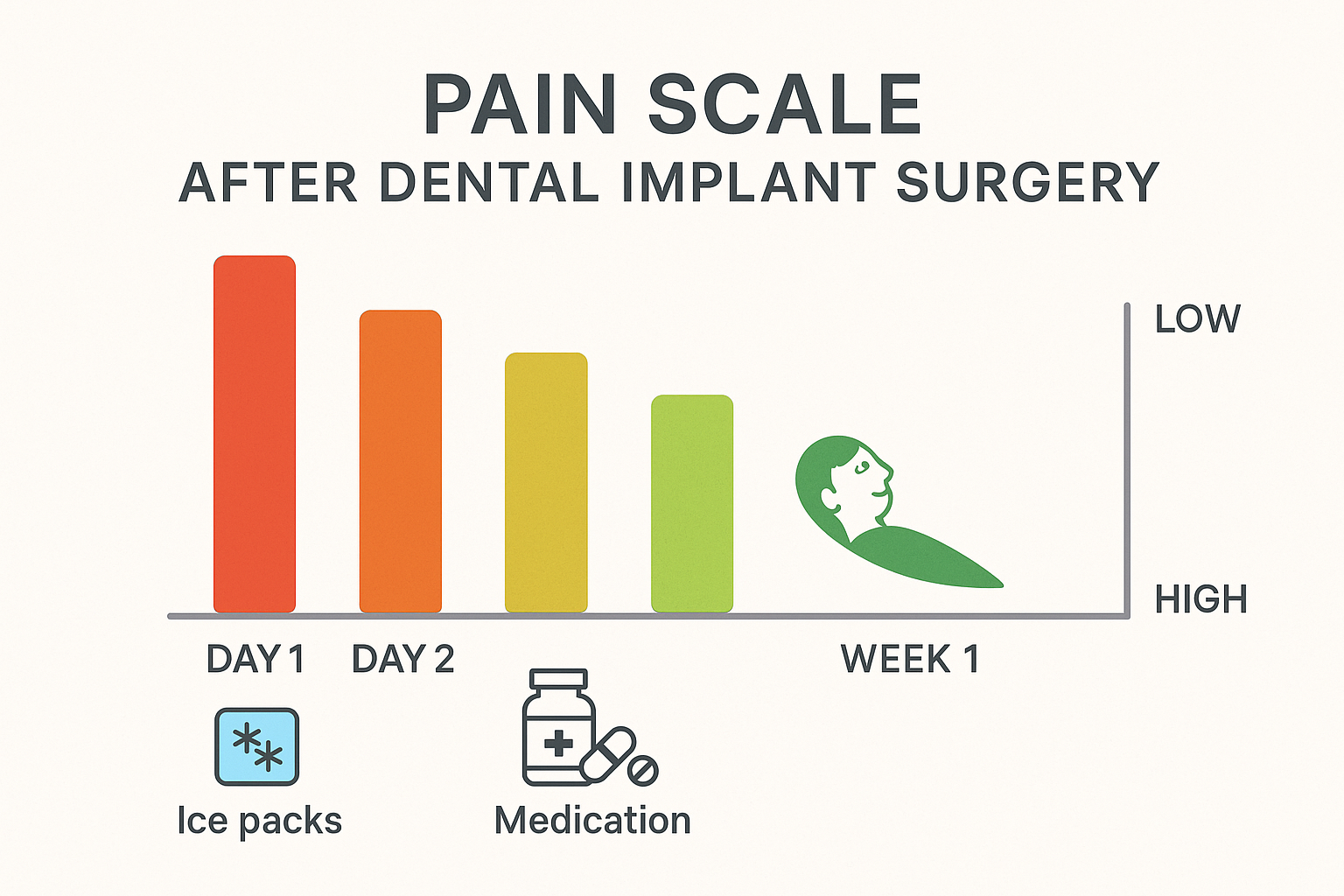
Let’s walk through what actually happens during your dental implant procedure so you know exactly what to expect:
Pre-Surgery Preparation 🏥
- Consultation and planning: Your dentist will review your treatment plan and answer any last-minute questions
- Anesthesia administration: Local anesthetic is applied to completely numb the surgical site
- Optional sedation: Many patients choose conscious sedation for added comfort and relaxation
The Surgical Process
- Incision: A small incision is made in your gum tissue
- Site preparation: The implant site is carefully prepared in your jawbone
- Implant placement: The titanium implant is precisely positioned
- Closure: The gum tissue is sutured closed over or around the implant
Duration: Most single implant procedures take 30-60 minutes. Multiple implants may require 2-3 hours.
Pain level during surgery: Zero. The anesthesia ensures you feel pressure and movement, but no pain.
The Recovery Timeline: When Are Dental Implants Painful?
Understanding the recovery timeline helps set realistic expectations for your healing journey:
Days 1-3: Initial Healing Phase
- Pain level: Moderate (typically 4-6 on a 10-point scale)
- What you’ll experience: Swelling, tenderness, minor bleeding
- Management: Prescribed pain medication, ice packs, soft foods
- Activity: Rest and avoid strenuous activities
Days 4-7: Improvement Phase
- Pain level: Mild to moderate (2-4 on a 10-point scale)
- What you’ll experience: Reduced swelling, less discomfort
- Management: Over-the-counter pain relievers may be sufficient
- Activity: Gradual return to normal activities
Weeks 2-4: Continued Healing
- Pain level: Minimal (1-2 on a 10-point scale)
- What you’ll experience: Occasional tenderness, continued tissue healing
- Management: Minimal pain medication needed
- Activity: Normal activities with some dietary restrictions
Months 2-6: Osseointegration
- Pain level: None to minimal
- What happens: Your implant fuses with your jawbone
- Follow-up: Regular check-ups to monitor healing progress
Dental Implant Pain Assessment Tool
Answer these questions to get a personalized assessment of what to expect during your dental implant recovery.
Factors That Influence Dental Implant Pain Levels
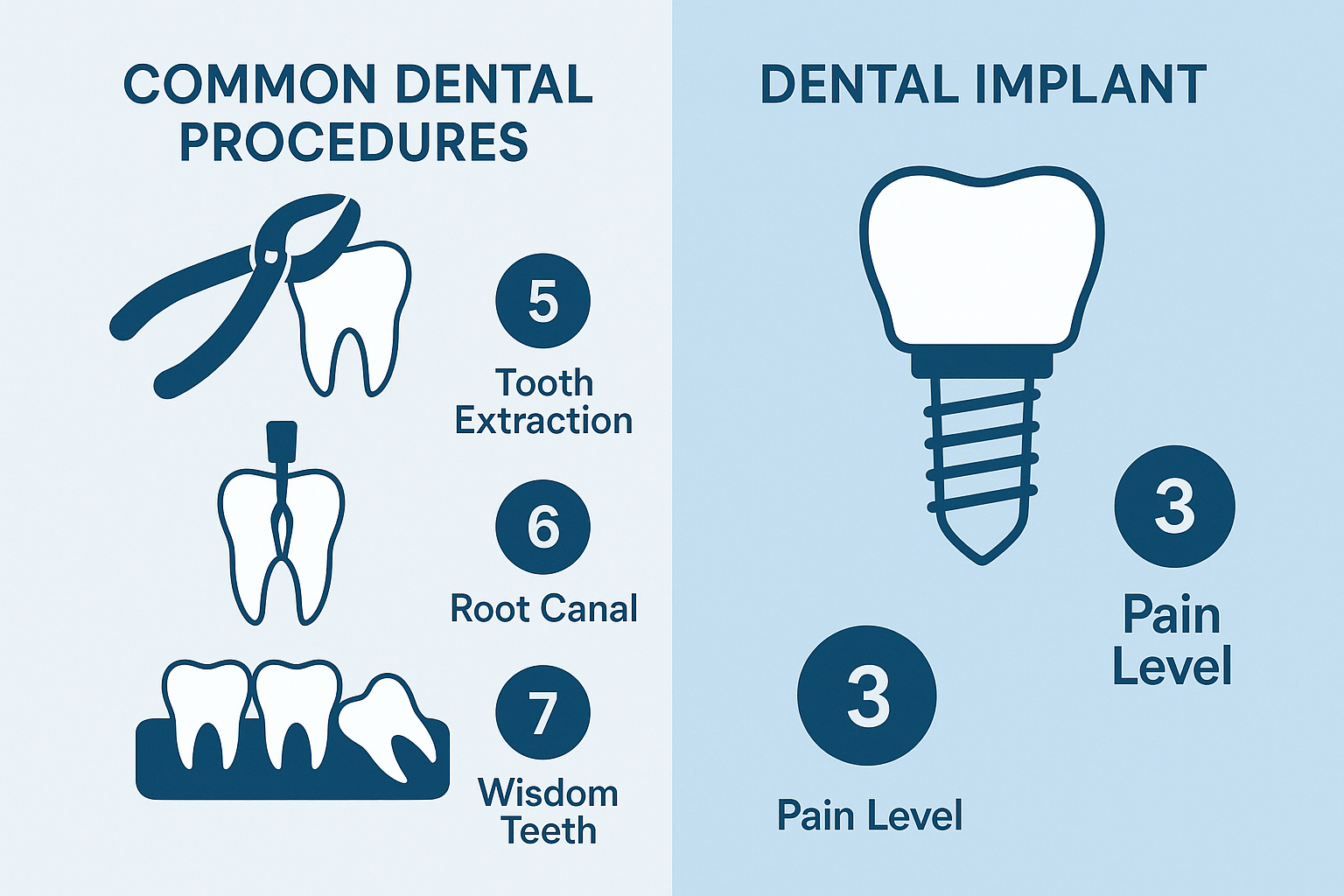
Not everyone experiences the same level of discomfort after dental implant surgery. Several factors can influence how much pain you might feel:
Individual Factors
- Pain tolerance: Everyone's threshold is different
- Age: Younger patients often heal faster with less discomfort
- Overall health: Good general health promotes faster healing
- Anxiety levels: High anxiety can increase perceived pain
Procedure-Related Factors
- Number of implants: Single implants typically cause less discomfort than multiple implants
- Surgical complexity: Simple cases hurt less than complex reconstructions
- Additional procedures: Bone grafting or extractions increase recovery time
- Surgeon expertise: Experienced practitioners often achieve better outcomes with less trauma
Post-Operative Factors
- Following instructions: Proper aftercare significantly reduces complications and pain
- Medication compliance: Taking prescribed medications as directed improves comfort
- Lifestyle choices: Avoiding smoking and alcohol promotes healing
Effective Pain Management Strategies
The key to a comfortable recovery lies in proactive pain management. Here's your comprehensive strategy:
Medication Management 💊
Prescription Pain Relievers
- Usually prescribed for the first 3-5 days
- Take as directed, even if you feel okay initially
- Don't wait until pain becomes severe to take medication
Over-the-Counter Options
- Ibuprofen (Advil, Motrin): Excellent for reducing inflammation and pain
- Acetaminophen (Tylenol): Good for general pain relief
- Can often be alternated for better coverage
Non-Medication Pain Relief
Ice Therapy
- Apply ice packs for 15-20 minutes at a time
- Most effective during the first 48 hours
- Helps reduce swelling and numb pain
Elevation
- Keep your head elevated while sleeping
- Use extra pillows or sleep in a recliner
- Reduces blood flow to the surgical site, minimizing swelling
Rest and Recovery
- Take time off work if possible (1-2 days minimum)
- Avoid strenuous activities for the first week
- Allow your body to focus energy on healing
Comparing Dental Implant Pain to Other Dental Procedures
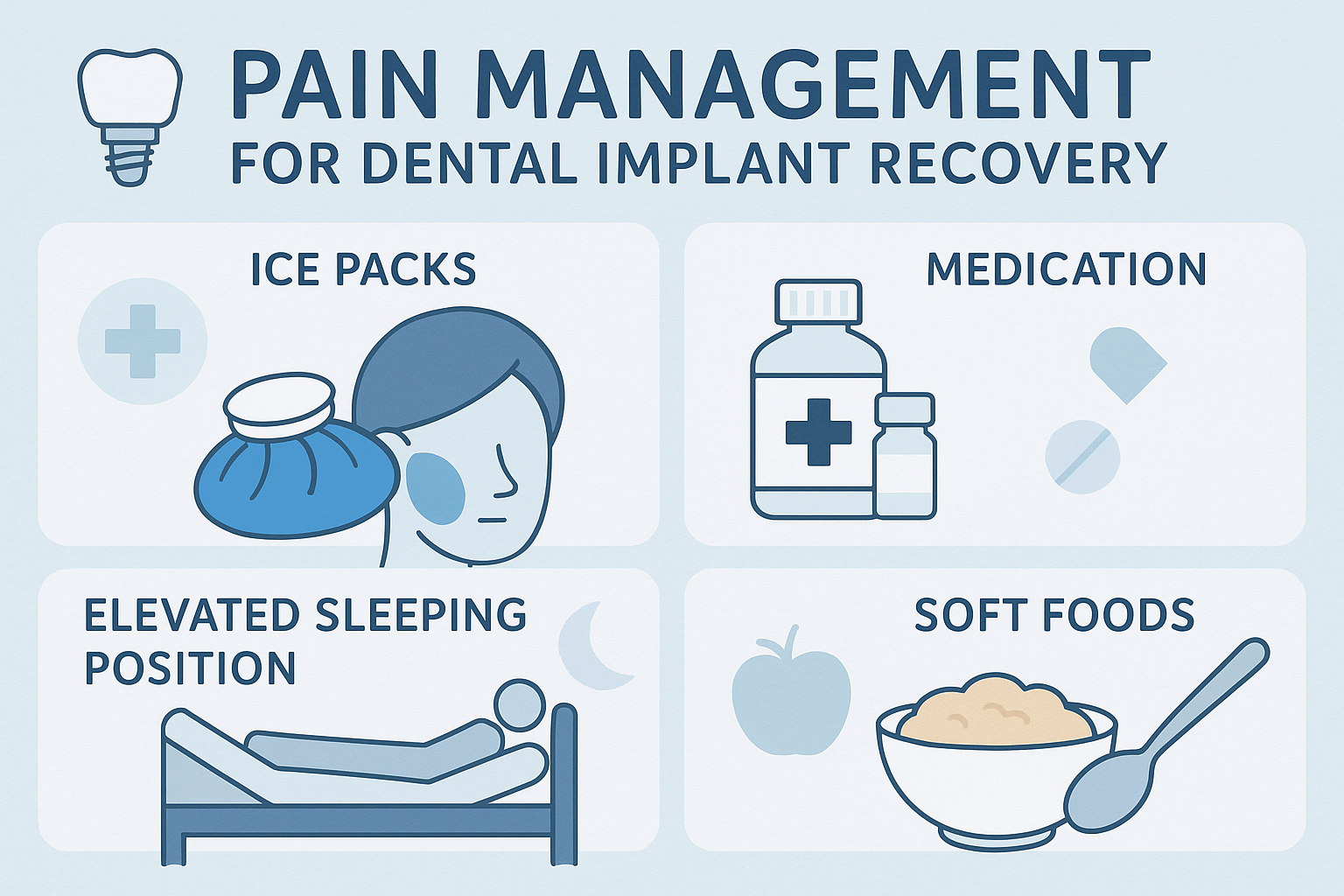
To put dental implant pain in perspective, let's compare it to other common dental procedures:
| Procedure | Pain Level (1-10) | Recovery Time | Pain Duration |
|---|---|---|---|
| Dental Implant | 4-6 | 1-2 weeks | 3-7 days |
| Tooth Extraction | 5-7 | 3-7 days | 2-5 days |
| Root Canal | 3-5 | 1-3 days | 1-3 days |
| Wisdom Tooth Removal | 6-8 | 1-2 weeks | 5-10 days |
| Gum Surgery | 5-7 | 1-2 weeks | 4-8 days |
Key insight: Dental implants typically cause less pain than wisdom tooth removal and similar discomfort to a tooth extraction, but the benefits last a lifetime.
When to Be Concerned: Red Flags During Recovery
While some discomfort is normal, certain symptoms warrant immediate attention:
Contact Your Dentist If You Experience:
- Severe pain that worsens after day 3
- Excessive bleeding that doesn't stop with pressure
- Signs of infection: fever, pus, foul taste or odor
- Numbness that persists beyond the first day
- Implant movement or looseness
Normal vs. Concerning Symptoms
Normal Recovery Signs ✅
- Mild to moderate pain that gradually improves
- Some swelling for 3-5 days
- Minor bleeding for 24-48 hours
- Bruising around the surgical site
- Difficulty chewing hard foods
Concerning Symptoms ⚠️
- Pain that suddenly worsens after improving
- Fever above 101°F (38.3°C)
- Excessive swelling that doesn't peak by day 3
- Persistent bleeding beyond 48 hours
- Severe, throbbing pain unrelieved by medication
Long-Term Comfort: Life After Dental Implant Healing
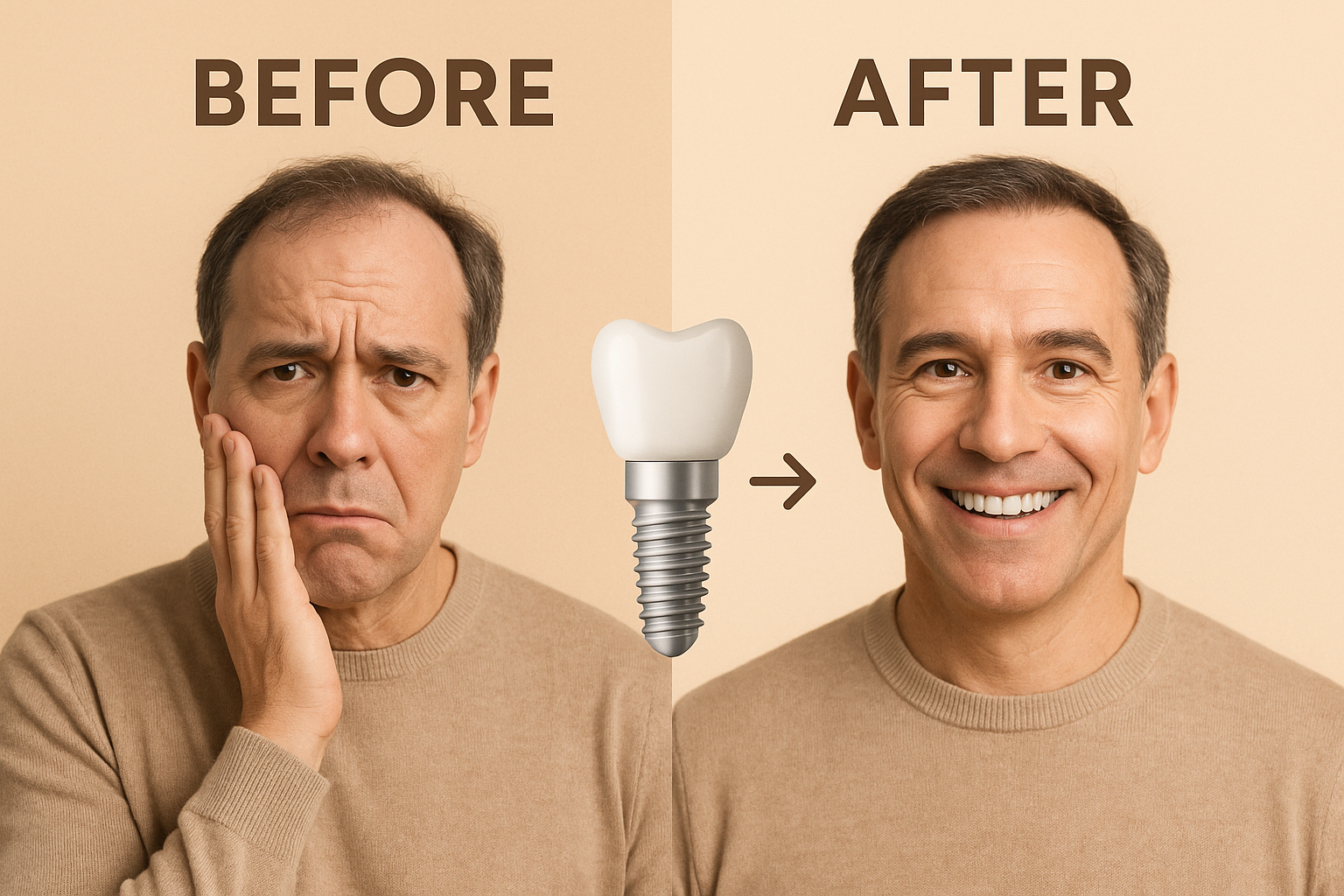
Here's the best news about dental implant pain: it's temporary, but the benefits are permanent. Once your implants heal completely (typically 3-6 months), you'll enjoy:
Immediate Benefits
- No more pain from missing teeth or ill-fitting dentures
- Confidence to smile without worrying about gaps
- Improved chewing ability for your favorite foods
- Better oral health compared to other tooth replacement options
Long-Term Advantages
- 25+ year lifespan with proper care
- Preservation of jawbone structure
- No impact on adjacent teeth (unlike bridges)
- Easy maintenance with regular brushing and flossing
Many patients tell me that the temporary discomfort of dental implant surgery was the best investment they ever made in their health and confidence.
Special Considerations for Different Patient Groups
Seniors and Medicare Recipients
If you're wondering about coverage options for dental implants, you're not alone. While Medicare typically doesn't cover dental implants, many seniors find the long-term benefits worth the investment. Older patients often experience:
- Similar pain levels to younger patients
- Slightly longer healing times (but still very manageable)
- Greater appreciation for improved quality of life
- Fewer complications when working with experienced providers
Patients with Dental Anxiety
If you're nervous about the procedure, remember:
- Sedation options are available to keep you comfortable
- The procedure itself is painless due to anesthesia
- Most anxiety comes from fear of the unknown—education helps
- Experienced dental teams in Dallas specialize in anxious patients
Choosing the Right Provider for Minimal Discomfort
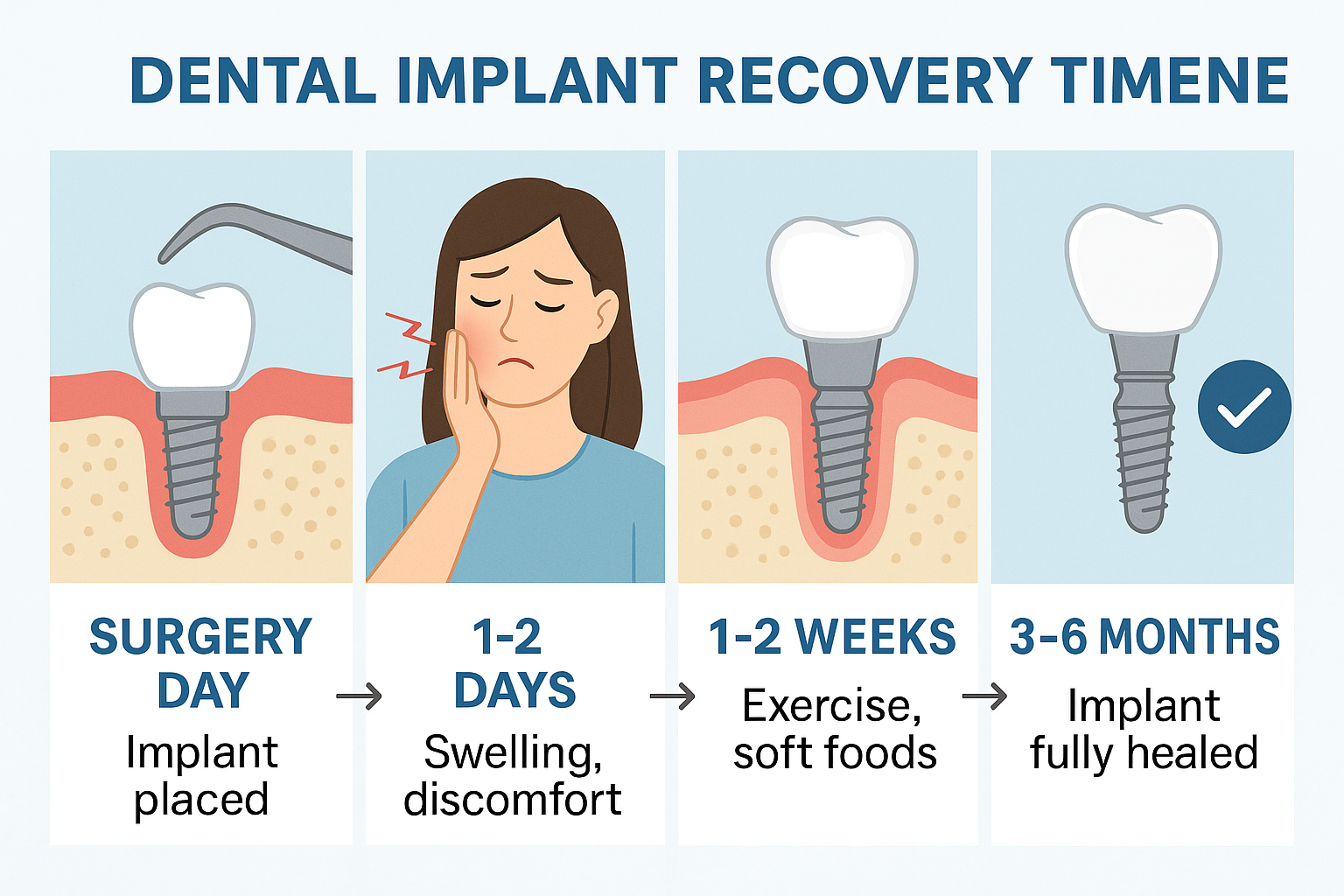
Your choice of dental provider significantly impacts your comfort level. When selecting a dental implant specialist in Dallas, look for:
Essential Qualifications
- Board certification in oral surgery or periodontics
- Extensive implant experience (ask about their success rates)
- Modern technology and techniques
- Comprehensive pain management protocols
Questions to Ask Your Provider
- "How many dental implant procedures do you perform monthly?"
- "What pain management options do you offer?"
- "Can you walk me through your typical recovery timeline?"
- "What sedation options are available?"
- "How do you handle emergency situations or complications?"
The Different Types of Dental Implants and Pain Levels
Not all dental implants are the same, and different types of dental implants may involve varying levels of discomfort:
Traditional Implants
- Single-stage placement: Moderate discomfort, faster recovery
- Two-stage placement: Slightly more discomfort, longer healing
- Recovery time: 3-6 months for complete healing
All-on-4 Implants
- More extensive procedure: Higher initial discomfort
- Immediate results: Temporary teeth placed same day
- Unique benefits: Fewer implants needed, faster overall treatment
Understanding your specific treatment plan helps set appropriate expectations for your recovery experience.
Real Patient Experiences: What People Actually Say
Here's what real patients commonly report about their dental implant experience:
"I was terrified about the pain, but honestly, it was less uncomfortable than when I had my wisdom teeth removed. The first two days were the worst, but by day four, I only needed ibuprofen." - Sarah, 45
"My dentist was right—the anticipation was worse than the actual procedure. I took three days off work, but I probably could have gone back after two days." - Michael, 52
"I wish I had done this years ago. Yes, there was some discomfort, but it was so worth it. I can eat anything now without pain or embarrassment." - Linda, 61
Common Themes from Patient Feedback:
- 85% of patients rate their pain as "manageable" or "less than expected"
- Most regret waiting so long to get implants due to fear
- The procedure itself is consistently rated as painless
- Recovery is faster than most anticipated
- Long-term satisfaction is extremely high (95%+ would recommend)
Insurance and Financial Considerations for Pain-Free Treatment
Understanding your financial options can reduce stress and help you focus on healing. While exploring whether Delta Dental covers implants or if medical insurance covers dental implants, remember that many practices offer:
Payment Options
- Flexible financing plans with low or no interest
- Insurance coordination to maximize your benefits
- Package deals for multiple implants
- Transparent pricing with no hidden fees
Cost-Benefit Analysis
When considering the investment, remember:
- One-time cost vs. ongoing denture maintenance
- 25+ year lifespan makes cost per year very reasonable
- Improved quality of life has immeasurable value
- Prevention of bone loss saves money on future treatments
Conclusion: Your Path to a Pain-Free, Confident Smile
So, are dental implants painful? The honest answer is that you'll experience some discomfort during recovery, but it's typically much less than people expect and completely manageable with proper care. Most patients describe the pain as moderate for a few days, then minimal for the remainder of the healing period.
The key takeaways for your journey:
✅ Modern techniques make dental implant surgery surprisingly comfortable
✅ Proper pain management keeps discomfort minimal and manageable
✅ Recovery is predictable with most improvement in the first week
✅ Long-term benefits far outweigh temporary discomfort
✅ Experienced providers make all the difference in your comfort level
Your Next Steps
Ready to take the next step toward your confident smile? Here's what I recommend:
- Schedule a consultation with an experienced dental implant provider to discuss your specific situation
- Ask detailed questions about pain management and recovery expectations
- Review your insurance options and financing plans
- Plan your recovery time with adequate rest and support
- Focus on the outcome—imagine biting into your favorite foods again without pain or worry
Remember, thousands of people in Dallas and across the country choose dental implants every year because the temporary discomfort leads to a lifetime of confident smiles. You deserve to smile with confidence, and expert care makes the journey as comfortable as possible.
Your journey to a better smile starts with a simple consultation. The team at our Dallas practice specializes in making dental implants stress-free and comfortable, guiding you through every step with empathy and expertise. Don't let fear of temporary discomfort keep you from the life-changing benefits of dental implants.
Take the first step today—your future self will thank you for choosing comfort, confidence, and expert care for your smile restoration journey.

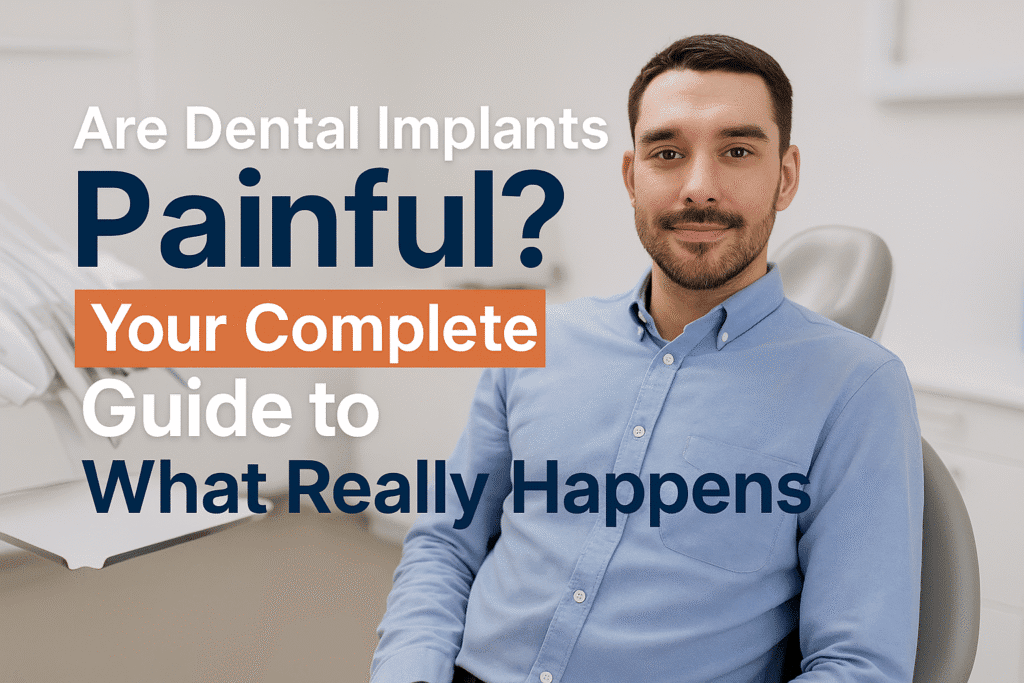
Leave a Reply
Share your thoughts or ask a question about dental implants. Your email address will not be published.